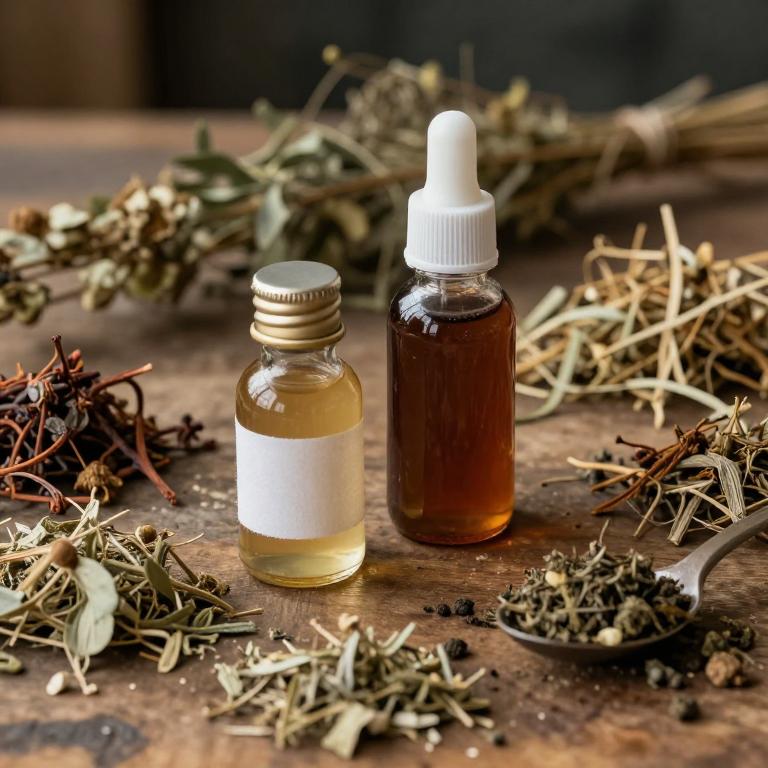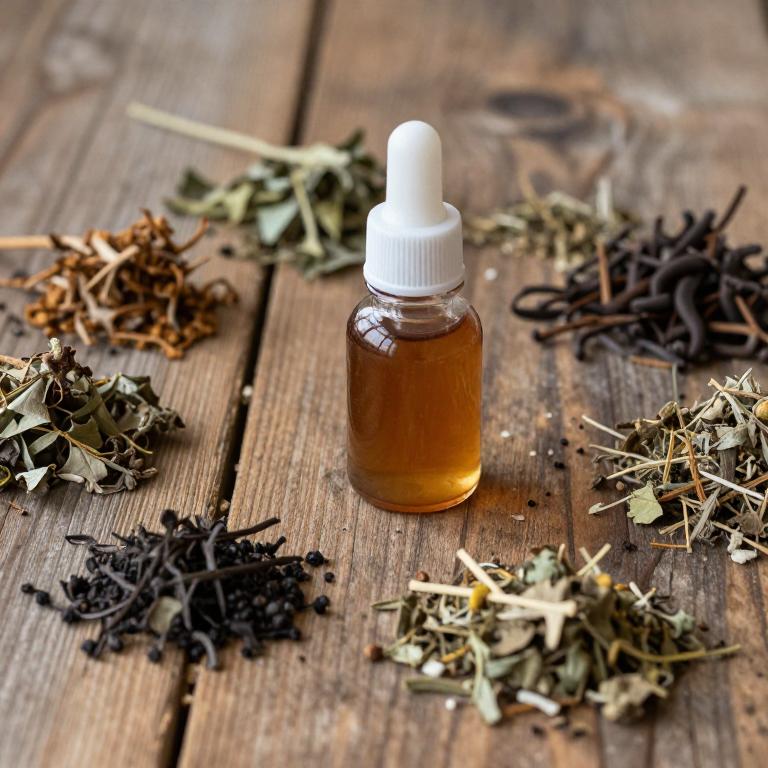10 Best Herbal Linctuses For Bronchitis

Herbal linctuses are traditional remedies used to alleviate symptoms of bronchitis by soothing the throat and reducing coughing.
They typically contain a blend of natural ingredients such as honey, licorice root, eucalyptus, and thyme, which have anti-inflammatory and antimicrobial properties. These linctuses work by coating the throat and loosening mucus, making it easier to expel. They are often preferred over conventional cough medicines due to their gentler nature and fewer side effects.
However, individuals with allergies or specific health conditions should consult a healthcare provider before use.
Table of Contents
- 1. Eucalyptus (Eucalyptus globulus)
- 2. Thyme (Thymus vulgaris)
- 3. Fennel (Foeniculum vulgare)
- 4. Peppermint (Mentha piperita)
- 5. Stinging nettle (Urtica dioica)
- 6. Salvia (Salvia officinalis)
- 7. Plantain (Plantago lanceolata)
- 8. Ginger (Zingiber officinale)
- 9. Rosemary (Rosmarinus officinalis)
- 10. Black elderberry (Sambucus nigra)
1. Eucalyptus (Eucalyptus globulus)

Eucalyptus globulus, commonly known as eucalyptus or gum tree, is a popular ingredient in herbal linctuses used to alleviate symptoms of bronchitis.
These linctuses typically contain a combination of eucalyptus oil and other soothing herbs such as thyme, sage, and ivy, which help to reduce inflammation and loosen mucus in the respiratory tract. The aromatic compounds in eucalyptus oil have decongestant properties that can ease breathing and provide a sense of relief from coughing. Herbal linctuses are often preferred by individuals seeking natural remedies for mild to moderate bronchial irritation.
However, they should be used as part of a broader treatment plan and under the guidance of a healthcare professional, especially for persistent or severe symptoms.
2. Thyme (Thymus vulgaris)

Thymus vulgaris, commonly known as thyme, is a herbal ingredient often used in linctuses to alleviate symptoms of bronchitis due to its antimicrobial and expectorant properties.
These linctuses typically contain thyme essential oil or dried thyme leaves, which help to loosen mucus and reduce inflammation in the respiratory tract. The active compounds, such as thymol and carvacrol, contribute to the plant's ability to combat bacterial and viral infections. Thyme-based linctuses are generally considered safe for most adults and can be a natural alternative to conventional cough medications.
However, they should be used under the guidance of a healthcare professional, especially for individuals with allergies or chronic respiratory conditions.
3. Fennel (Foeniculum vulgare)

Foeniculum vulgare, commonly known as fennel, has been traditionally used in herbal linctuses to alleviate symptoms of bronchitis due to its expectorant and antispasmodic properties.
The essential oils in fennel, particularly anethole and fenchone, help to loosen mucus and reduce bronchial irritation, making it easier to expel phlegm. These herbal linctuses are often prepared by combining fennel seeds or oil with honey or other soothing agents to enhance their therapeutic effects. They are particularly beneficial for dry or productive coughs associated with acute or chronic bronchitis.
However, it is important to consult a healthcare professional before using fennel-based remedies, especially for prolonged or severe cases of bronchitis.
4. Peppermint (Mentha piperita)

Mentha piperita, commonly known as peppermint, is often used in herbal linctuses to alleviate symptoms of bronchitis due to its expectorant and decongestant properties.
These linctuses help to loosen mucus in the respiratory tract, making it easier to cough up and reducing chest congestion. The menthol content in peppermint provides a cooling effect that can soothe irritated airways and reduce inflammation. Peppermint linctuses are typically used as a complementary therapy alongside other treatments for chronic or acute bronchitis.
However, they should be used under the guidance of a healthcare professional, especially for individuals with asthma or other respiratory conditions.
5. Stinging nettle (Urtica dioica)

Urtica dioica, commonly known as stinging nettle, has been traditionally used in herbal medicine for its anti-inflammatory and expectorant properties.
When prepared as a linctus, or herbal syrup, it can help soothe irritated airways and ease coughing associated with bronchitis. The active compounds in Urtica dioica, such as flavonoids and mucilage, may help reduce mucus viscosity and promote easier breathing. While it is generally considered safe, it is important to consult a healthcare provider before using it, especially for individuals with allergies or those taking other medications.
This natural remedy is often used as a complementary treatment to support respiratory health during bronchial inflammation.
6. Salvia (Salvia officinalis)

Salvia officinalis, commonly known as sage, has been traditionally used in herbal medicine to prepare linctuses for the relief of bronchitis symptoms.
These linctuses are typically made by extracting the essential oils and mucilage from the leaves of the plant, which have expectorant and antiseptic properties. The soothing effects of sage linctuses can help reduce coughing and clear mucus from the respiratory tract. Due to its anti-inflammatory and antimicrobial properties, sage is believed to support the healing process in cases of bronchitis.
However, it is important to consult a healthcare professional before using sage linctuses, especially for prolonged or severe respiratory conditions.
7. Plantain (Plantago lanceolata)

Plantago lanceolata, commonly known as plantain, has been traditionally used in herbal medicine for its soothing properties, and its linctus form is often employed to alleviate symptoms of bronchitis.
The mucilage present in the plant helps to coat and protect the irritated bronchial passages, reducing coughing and inflammation. Herbal linctuses made from Plantago lanceolata are typically prepared by combining the dried leaves with honey or other natural sweeteners to create a thick, viscous preparation. These linctuses are valued for their mild, non-irritating nature, making them suitable for both children and adults.
While they are not a cure for bronchitis, they can provide symptomatic relief and support the body's natural healing process when used as part of a holistic treatment plan.
8. Ginger (Zingiber officinale)

Zingiber officinale, commonly known as ginger, has been traditionally used in herbal linctuses for the relief of symptoms associated with bronchitis.
These linctuses often combine ginger with other soothing ingredients like honey and licorice root to create a warm, aromatic remedy that helps alleviate coughing and throat irritation. The active compounds in ginger, such as gingerol and shogaol, possess anti-inflammatory and bronchodilatory properties that may help reduce airway inflammation and ease breathing. When used as a natural alternative to conventional cough suppressants, ginger-based linctuses can provide gentle relief without the side effects of pharmaceutical drugs.
However, it is important to consult a healthcare provider before using these remedies, especially for individuals with existing health conditions or those taking other medications.
9. Rosemary (Rosmarinus officinalis)

Rosmarinus officinalis, commonly known as rosemary, is often used in herbal linctuses to alleviate symptoms of bronchitis due to its antimicrobial and anti-inflammatory properties.
These linctuses typically contain rosemary essential oil or dried rosemary leaves, which can help reduce mucus production and ease coughing. The aromatic compounds in rosemary may also provide a soothing effect on the respiratory tract, promoting easier breathing. While not a cure for bronchitis, rosemary-based linctuses can serve as a natural complement to conventional treatments.
However, it is important to consult a healthcare professional before using any herbal remedies, especially for individuals with allergies or chronic respiratory conditions.
10. Black elderberry (Sambucus nigra)

Sambucus nigra, commonly known as elderberry, is often used in herbal linctuses for the treatment of bronchitis due to its potential anti-inflammatory and immune-boosting properties.
These linctuses typically contain extracts from the berries, which are rich in flavonoids and antioxidants that may help reduce respiratory inflammation and support the body’s natural defenses. While some studies suggest that elderberry may alleviate symptoms of respiratory infections, more research is needed to confirm its efficacy specifically for bronchitis. Herbal linctuses containing Sambucus nigra are generally considered safe when used as directed, though they should not replace prescribed medical treatments for severe cases.
It is advisable to consult a healthcare provider before using these remedies, especially for individuals with allergies or chronic respiratory conditions.